Air travel is pretty terrifying since airports are getting more intense and stricter. It’s a rough journey from your bed to the departure gate. But that only makes the destination better.
Travelers are afraid of getting delayed, or even having their luggage “lost”. With the safety risks and horror stories, the idea of flying is enough to make us sprint towards the coach window seat and sacrifice legroom for comfort.

Air travel is a necessary evil. It is a way of life for many people, but it can also be a nightmare. There are plenty of things that can go wrong with air travel, and there are plenty of nightmares to be had.
People who have flown before know that it’s not always a pleasant experience. But what if I tell you that there are some nightmares from air travel that will make you glad to be on the ground?
Some people say that air travel is one of the worst nightmares they have ever faced. This article will focus on some of the nightmares from air travel that might make you glad to be on the ground in one piece. Below we will discuss fifteen most common nightmares from air travel:
Got a fear of flying? This will make it feel like you’re sitting still.
1) People Who Are Afraid Of Flying

Air travel is one of the most common nightmares for people who are afraid of flying. The fear can be so severe that it causes panic attacks, which can be very difficult to control.
It is not uncommon for people to have a fear of flying, also known as aviophobia or aviatophobia. This fear can range from mild anxiety to a severe phobia that prevents someone from being able to fly at all.
There are many different reasons why people may be afraid of flying. Some people may be concerned about the safety of the aircraft, while others may be worried about being in a confined space or losing control. For some people, a fear of flying may be related to a past traumatic experience or a general anxiety disorder.
If you are afraid of flying, there are steps you can take to manage your anxiety and make your experience more comfortable:
- Educate yourself about flying: Understanding how planes work and the safety measures in place can help to alleviate some of your fears.
- Talk to a therapist: A therapist can help you identify the root cause of your fear and develop coping strategies.
- Practice relaxation techniques: Deep breathing, progressive muscle relaxation, and mindfulness can help to reduce anxiety.
- Consider medication: In some cases, medication may help manage anxiety symptoms. It is important to speak with a healthcare professional about the potential risks and benefits of medication.
- Seek support from friends and family: Having someone to talk to and support you can make a big difference in managing your anxiety.
In conclusion, a fear of flying is a common anxiety that can range from mild to severe. There are steps you can take to manage your anxiety, such as educating yourself about flying, talking to a therapist, practicing relaxation techniques, and seeking support from friends and family. In some cases, medication may also help manage anxiety symptoms.
2) Aircraft Losing The Engine Power

The worst nightmare is the one where you are on a plane that has lost its engine power and is plummeting to the ground.
We all get that nervous feeling as the plane starts speeding off the ground and heading up in the sky. And while planes are technically much safer than cars and trains, something about traveling 10,000+ feet in the air with engines that could be shutting down at any moment is enough to give anyone a nightmare or two.
Losing engine power while flying can be a very frightening experience, as it can potentially put the aircraft and its occupants in danger. Here is a plan for handling such a situation:
- Stay calm: It is important to remain calm in this situation, as panic can only make things worse. Take a few deep breaths and try to clear your mind.
- Follow procedures: The first step in handling a power loss is to follow the procedures outlined in the aircraft’s emergency checklist. This may include shutting off certain systems or attempting to restart the engine.
- Communicate with air traffic control: If you are in contact with air traffic control, inform them of the situation and your intentions. They may be able to provide guidance and assistance.
- Glide the aircraft: If the engine has completely failed, you will need to glide the aircraft to a suitable landing spot. Look for a flat, open area such as a field or runway.
- Prepare for a forced landing: If you are unable to find a suitable landing spot, you may need to make a forced landing. This is a risky maneuver, and you should be prepared for the possibility of a crash.
- Evacuate the aircraft: If you do have to make a forced landing, your priority should be getting everyone out of the aircraft as quickly and safely as possible. Follow the emergency evacuation procedures outlined in the aircraft’s manual.
Overall, the key to handling a power loss is to stay calm, follow procedures, and communicate with those around you. With quick thinking and careful planning, you may be able to safely land the aircraft and evacuate its occupants.
3) Aircraft Hijacking

Another worst nightmare is when you are on a plane that has been hijacked and the hijacker wants to crash it into a building. In both cases, there is no way out of your situation.
A hijacking can be a very frightening experience for those on board an aircraft. The fear and uncertainty of not knowing what the hijackers will do or what the outcome will be can be overwhelming. Here is a plan for handling a hijacking situation:
- Stay calm: It is important to try to remain as calm as possible in this situation. Panic can only make things worse, and it is important to think clearly and follow instructions.
- Follow instructions: The hijackers will likely issue instructions or demands. It is important to follow these instructions as closely as possible, as any deviation from them could potentially escalate the situation.
- Look for an opportunity to escape: If you are allowed to leave the aircraft or if there is a lull in the situation, try to find a way to escape. Look for exits or opportunities to communicate with authorities.
- Communicate with authorities: If you can get in contact with authorities, provide as much information as possible about the hijackers and the situation on board the aircraft.
- Stay low and out of sight: If you are unable to escape or communicate with authorities, try to stay low and out of sight. This may reduce the chances of being noticed by the hijackers and potentially being harmed.
- Stay together with other passengers: If possible, try to stay together with other passengers. This can provide a sense of safety and support in a difficult situation.
Overall, the key to handling a hijacking situation is to stay calm, follow instructions, and look for opportunities to escape or communicate with authorities. It is also important to try to stay low and out of sight and to stay together with other passengers if possible.
4) The Possibility Of Being Stranded

Whether it is a mechanical problem or bad weather, the possibility of being stranded can cause anxiety and panic attacks in travelers.
Being stranded from flying fear, also known as aviophobia or aviatophobia, is the fear of flying in an aircraft. This fear can range from mild anxiety to severe panic and can be triggered by a variety of factors such as turbulence, claustrophobia, or a previous traumatic experience while flying.
The possibility of being stranded due to flying fear depends on the severity of the fear and the individual’s ability to cope with it. Some people with flying fear may be able to manage their anxiety through relaxation techniques, such as deep breathing or visualization, or by seeking the help of a therapist or other mental health professional. Others may need to avoid flying altogether to feel comfortable and safe.
If someone with flying fear can manage their anxiety and fly, they may still face the possibility of being stranded if their fear becomes unmanageable while in the air. In this case, the individual may need to disembark the plane and seek help from a mental health professional to address their fear and regain their ability to fly.
Individuals with flying fear need to seek help if their fear is causing significant distress or disrupting their ability to travel. With the appropriate support and treatment, individuals with flying fear can manage their anxiety and continue to fly.
5) Security Checks at Airports
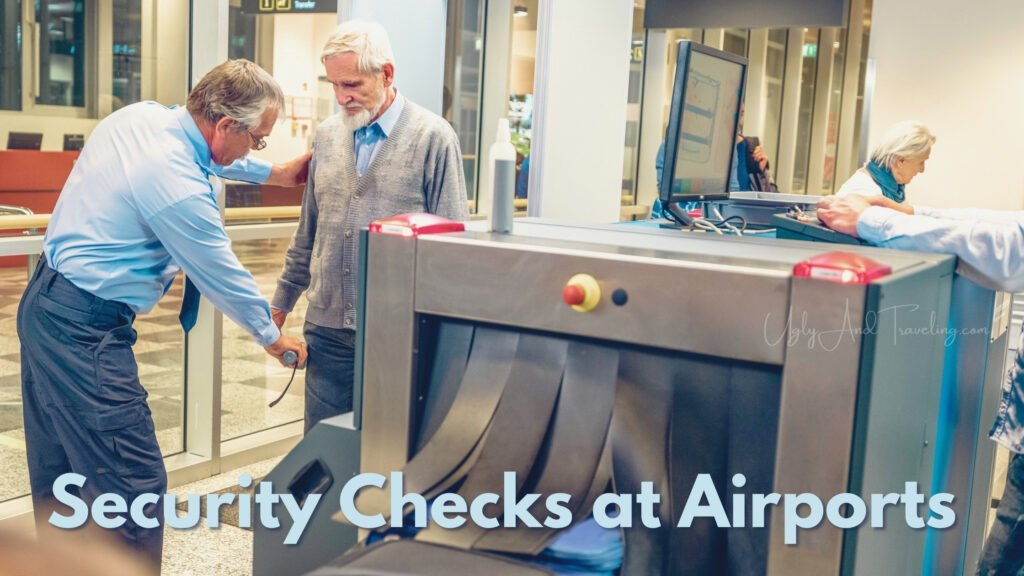
Air travel is not always the most pleasant experience. It’s a long flight, you have to wait for your luggage, you have to go through security, there are delays, etc. It’s no wonder that many people have nightmares about their flights.
Security checks at airports are often strict to ensure the safety of travelers and to prevent any potential threats from entering the aircraft. While these measures can sometimes be inconvenient, they are necessary to protect the lives of those on board the plane.
Understandably, some people may feel anxious or fearful about going through security checks at the airport. These checks can involve being asked to remove your shoes, jacket, and other items, as well as passing through metal detectors and having your luggage searched.
However, it is important to remember that the security staff at the airport are trained professionals who are there to ensure the safety of everyone at the airport. They are not there to make your travel experience difficult or to cause you stress.
If you are worried about going through security at the airport, it may be helpful to arrive at the airport early to give yourself plenty of time to go through the process. It can also be helpful to familiarize yourself with the security procedures before you arrive at the airport so you know what to expect.
In conclusion, while security checks at the airport may seem strict, they are an essential part of ensuring the safety of travelers. It is important to cooperate with the security staff and to remember that they are there to protect you and those around you.
6) Airplane Food

It is not uncommon for people to be concerned about the quality of the food on a plane. Airline food has sometimes received a bad reputation for being bland, unappealing, or of poor quality.
However, it is important to remember that preparing food for a large number of people at high altitudes can be challenging. The cabin pressure and dry air on a plane can also affect the taste of the food.
Despite these challenges, many airlines have made efforts to improve the quality of their in-flight meals. Many now offer a variety of meal options, including vegetarian, vegan, and low-carb options. Some airlines also partner with well-known chefs to create special menus for their flights.
If you are concerned about the food on your flight, you may want to consider packing your snacks or meals. Non-perishable items like granola bars, crackers, and nuts are good options. You can also bring empty water bottles to fill after passing through security to stay hydrated on the flight.
In conclusion, while the food on a plane may not always be the best, there are ways to manage your expectations and ensure that you have something to eat during your flight. Bringing your snacks and staying hydrated can help to make your experience more enjoyable.
7) The Plane Delayed
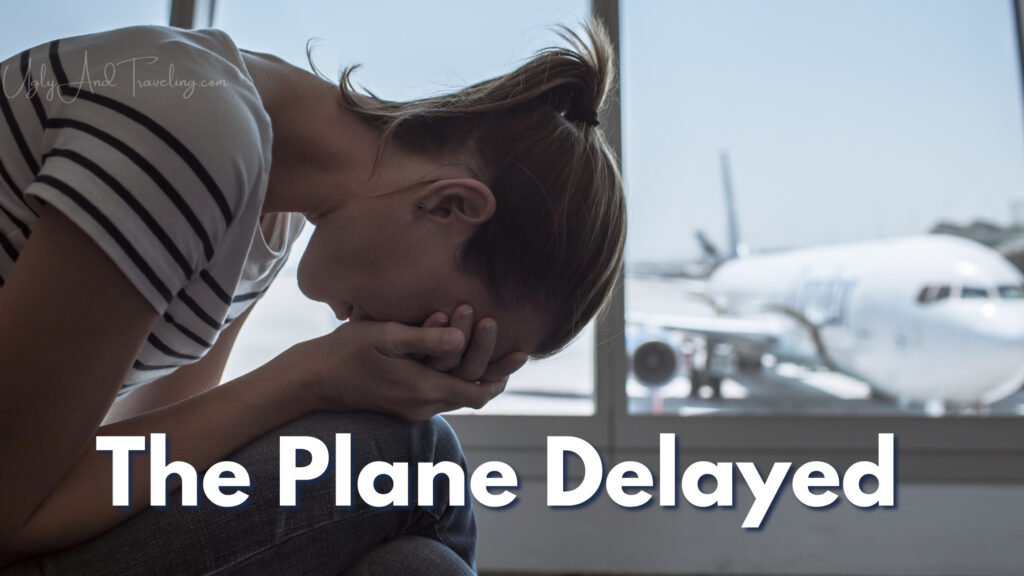
It is not uncommon for flights to be delayed, and this can be a source of frustration and anxiety for many travelers. Delays can be caused by a variety of factors, including mechanical issues, inclement weather, air traffic control, and more.
If your flight is delayed, it is important to stay calm and try to stay informed about what is happening. Many airports and airlines provide updates about flight delays on their websites and social media accounts, so it is a good idea to check these sources of information.
It can also be helpful to speak with the airline or airport staff to find out more about the cause of the delay and how long it is expected to last. They may be able to provide you with additional information or assistance.
If you are concerned about missing a connecting flight or other travel arrangements due to a delay, it is a good idea to notify the relevant parties as soon as possible. The airline may be able to help you rebook your connecting flight or make other arrangements.
In conclusion, while flight delays can be frustrating, it is important to stay calm and try to stay informed about what is happening. Speaking with the airline or airport staff and notifying relevant parties of any travel disruptions can also help to minimize the impact of the delay.
8) You Are On The Wrong Flight

It is not also uncommon for people to worry about being on the wrong flight, especially if they are traveling to a new or unfamiliar destination. However, it is important to remember that mistakes do happen and there are steps you can take to ensure that you are on the correct flight.
One way to avoid getting on the wrong flight is to double-check your flight information before you leave for the airport. Make sure that you have the correct date, time, and flight number, and verify this information with your airline or travel agent if you are unsure.
It is also a good idea to arrive at the airport early so that you have plenty of time to check in and go through security. This will allow you to ask questions and confirm your flight information if you are unsure.
If you are already at the airport and are concerned that you may be on the wrong flight, speak with the airport staff or the airline representative as soon as possible. They will be able to verify your flight information and help you make any necessary changes.
In conclusion, while it is natural to worry about being on the wrong flight, there are steps you can take to ensure that you are on the correct flight. Double-checking your flight information, arriving at the airport early, and speaking with the airport staff or airline representative can help to minimize the risk of getting on the wrong flight.
9) The Flight Is Cancelled
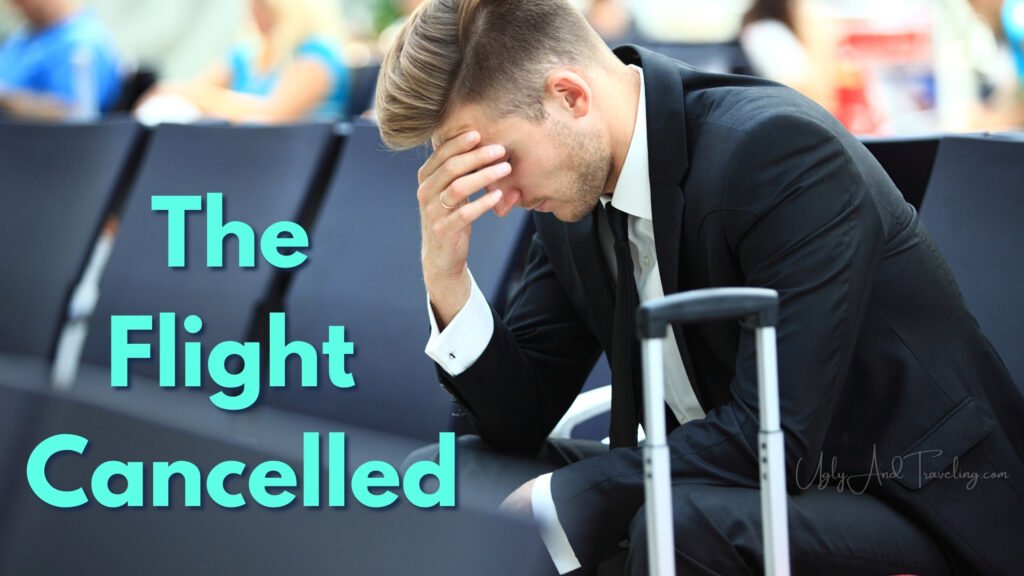
Imagine the panic when your flight is delayed or canceled. From a faulty engine to an important meeting, you want to be on your way. But then the airport can turn into a stressful nightmare with long queues, missed baggage, and gate changes.
It can be stressful and frustrating when a flight is canceled, especially if you have made other travel arrangements or have a tight schedule. However, it is important to remember that flight cancellations can be caused by a variety of factors, including mechanical issues, inclement weather, air traffic control, and more.
If your flight is canceled, the first thing you should do is speak with the airline or airport staff to find out what your options are. They may be able to rebook you on another flight or offer you a refund if your flight was non-refundable.
It is also a good idea to notify any hotels, rental car companies, or other travel partners about the cancellation. They may be able to make alternative arrangements for you or adjust your reservation.
If you are unable to find a satisfactory solution with the airline, you may want to consider booking a flight with another carrier. It is important to do this as soon as possible, as flights may fill up quickly during peak travel times.
In conclusion, while flight cancellations can be frustrating, there are steps you can take to minimize the impact of the disruption. Speaking with the airline or airport staff and notifying other travel partners can help to ensure that you can make alternative arrangements and continue your travels as smooth as possible.
10) The Seats Are Too Small

It is not uncommon for people to feel anxious or uncomfortable about the size of the seats on a plane. Many people find that the seats are too small, especially on long flights where they may be sitting in the same position for several hours.
One way to mitigate this concern is to choose an airline that has larger seats or more legroom. Some airlines offer premium economy or business class seats that may be more spacious and comfortable. It is also possible to purchase an upgrade to a premium seat at an additional cost.
If you are unable to upgrade your seat, there are still things you can do to make your flight more comfortable. For example, you can bring a small pillow or a lumbar roll to support your lower back and help reduce muscle fatigue. You can also bring a blanket or a lightweight jacket to stay warm during the flight.
In conclusion, while the size of the seats on a plane may be a concern for some people, there are ways to make your flight more comfortable. Choosing an airline with larger seats or upgrading to a premium seat can help, as can bringing supportive items like pillows and blankets.
11) Flight Attendants Are Not Friendly
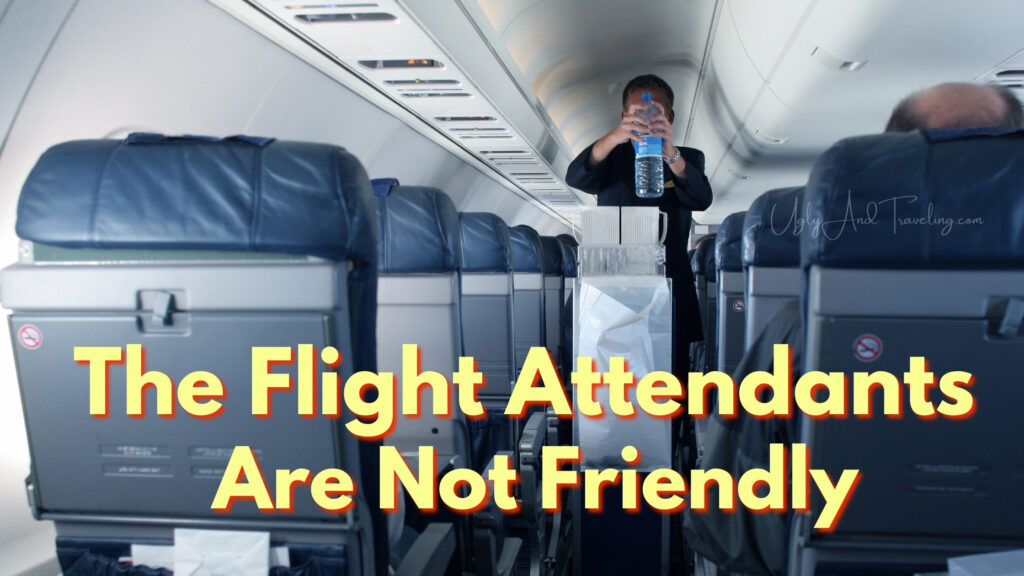
It is natural to want to feel supported and assisted during a flight, and having friendly and helpful flight attendants can certainly contribute to a positive experience. However, it is important to keep in mind that flight attendants have demanding jobs and may not always be able to provide the level of service that you expect.
There are several reasons why a flight attendant may not seem friendly or helpful. They may be under a lot of stress, dealing with difficult passengers, or simply trying to manage a large number of tasks at once. It is also possible that they are not feeling well or are experiencing personal problems that are affecting their demeanor.
If you feel that the flight attendants on your flight are not being friendly or helpful, it may be helpful to approach the situation with understanding and empathy. Remember that they are human and may be going through their challenges.
If you have a specific concern or request, try to communicate it clearly and calmly. It may also be helpful to ask the flight attendants if there is anything you can do to help make their job easier.
In conclusion, while it is certainly preferable to have friendly and helpful flight attendants, it is important to remember that they are under a lot of pressure and may not always be able to provide the level of service that you expect. Approach the situation with understanding and empathy, and do your best to communicate any concerns or requests calmly and clearly.
12) Getting Sick On The Plane

Flying is a great way to get from one place to another, but it does come with some risks such as getting sick from sitting too close to someone who is already ill or eating food that has gone bad.
Getting sick on a plane, also known as aero-sickness or motion sickness, is a common fear among travelers. This fear can be triggered by a variety of factors, including turbulence, the confined space of an aircraft, and the movement of the plane.
The possibility of getting sick on a plane can be reduced by taking certain precautions, such as avoiding alcohol and caffeine before and during the flight, choosing a seat with less movement, and getting up and stretching periodically during the flight. Some people may find it helpful to take over-the-counter motion sickness medication or to use acupressure wristbands.
If someone does get sick on a plane, it is important to stay hydrated and to ask a flight attendant for help if necessary. Most planes are equipped with sick bags and other necessary items to help passengers who become sick. It is also a good idea to inform the flight crew if you are feeling ill, as they may be able to offer additional support and assistance.
Overall, the possibility of getting sick on a plane can be reduced by taking precautions and seeking help if necessary. With the appropriate care and support, it is possible to manage aero-sickness and continue to fly comfortably.
13) Missing Flight Connections
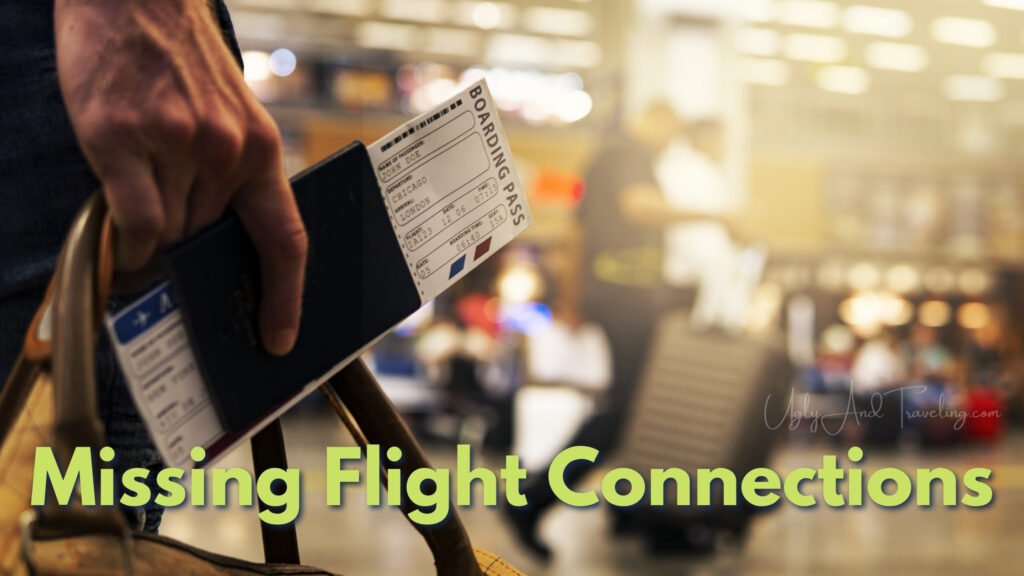
Missing a connection due to delays is a common fear among travelers, as it can lead to inconvenience and added stress. This fear can be triggered by a variety of factors, including flight delays, layovers that are too short, and unexpected events such as weather or mechanical issues.
The possibility of missing a connection due to delays can be reduced by planning ahead and allowing sufficient time for layovers. It is also a good idea to check the status of your flight and stay informed about any potential delays or disruptions. In addition, it is helpful to pack light and have all necessary documents and information easily accessible in case you need to make last-minute arrangements.
If you do miss a connection due to delays, it is important to stay calm and notify the appropriate authorities or your airline as soon as possible. Most airlines will do their best to accommodate travelers who miss their connections, whether by rebooking them on another flight or providing other assistance. It is also a good idea to have a contingency plan in case you do miss a connection, such as having contact information for your final destination or a backup plan for overnight accommodations.
Overall, the possibility of missing a connection due to delays can be reduced by planning and staying informed, and by being prepared in case of unexpected disruptions. With the appropriate planning and support, it is possible to navigate delays and continue on your journey.
14) Getting Stuck On An Airplane Toilet
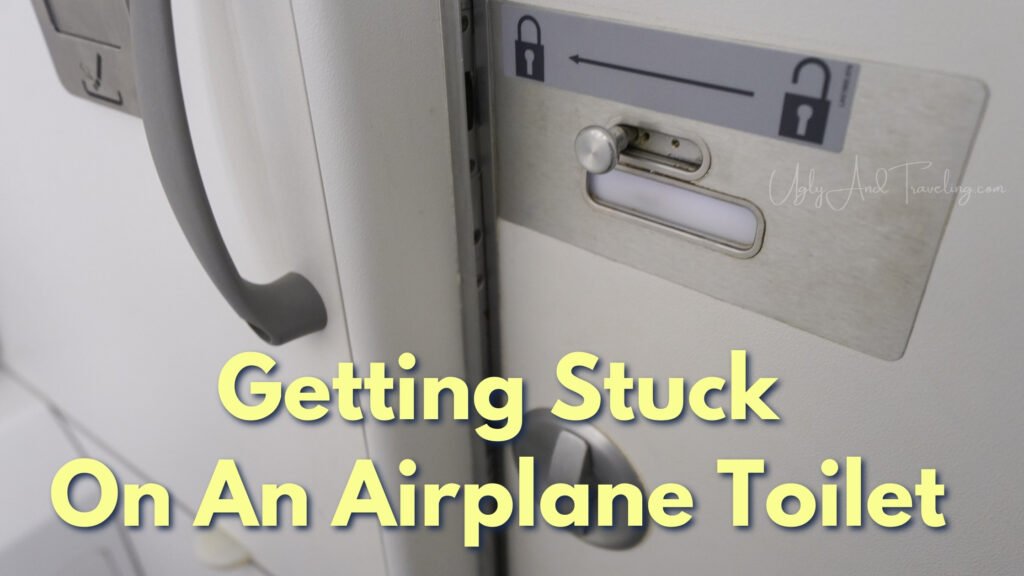
If this has happened to you, then I feel terrible for you.
Being stuck in an airplane toilet can be a very frightening experience, as it can leave you feeling isolated and vulnerable. Here is a plan for handling this situation:
- Stay calm: It is important to remain as calm as possible, as panic can only make things worse. Take a few deep breaths and try to clear your mind.
- Try to open the door: First, try to open the door by pushing or pulling on the handle. If it does not budge, try using your shoulder or another part of your body to push against the door.
- Call for help: If the door does not open and you are unable to get out, call for help using the call button or intercom system. Explain your situation and request assistance.
- Use your phone: If you have a phone with you, try calling someone outside the toilet to ask for help and of course that you can do when the plane lands upon getting mobile signals.
- Use a tool: If you have a tool or object with you, such as a pen or spoon, you can try using it to pry open the door or manipulate the lock.
- Wait for assistance: If none of these methods work, it is important to remain patient and wait for assistance. Someone will eventually come to your aid.
Overall, the key to handling this situation is to stay calm and try different methods for getting out of the toilet. If all else fails, call for help and wait patiently for assistance to arrive.
15) You Can’t Find Your Luggage
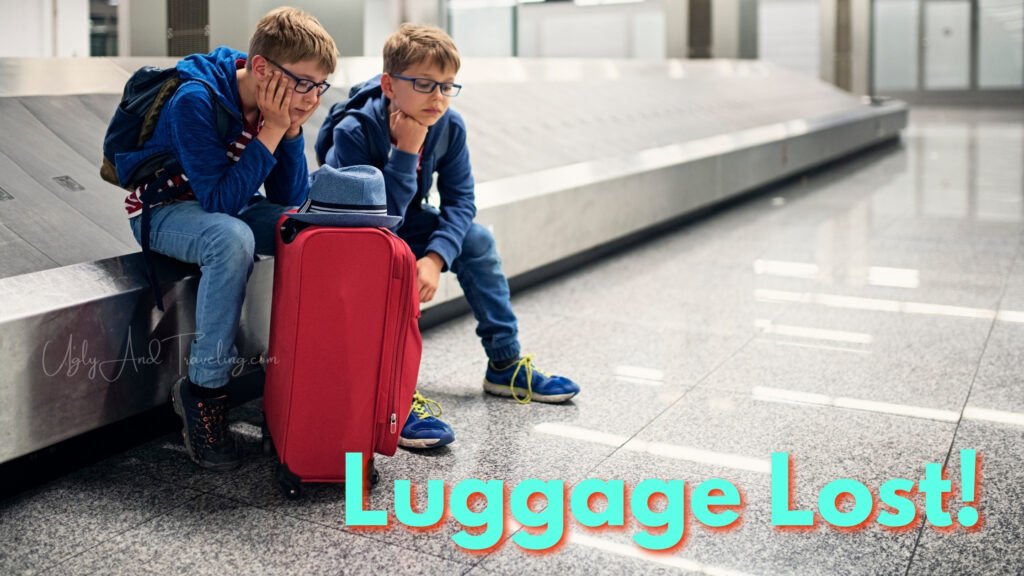
This is one of the worst things that can happen when you fly because it means you have to go shopping right away before your trip starts!
Losing your luggage at the airport can be a stressful and frustrating experience. It is not uncommon for people to worry about not being able to find their luggage when they arrive at their destination.
There are a few steps you can take to help prevent this from happening:
- Use distinctive luggage tags: Attach a luggage tag to your luggage with your name, address, and phone number on it. This will help to identify your luggage if it becomes separated from you.
- Pack a change of clothes in your carry-on bag: In case your luggage is lost, it is a good idea to pack a change of clothes and any essential items in your carry-on bag. This will help to make you more comfortable if you need to wait for your luggage to be located.
- Keep your luggage in sight: Whenever possible, try to keep your luggage within sight. This will help to prevent it from being misplaced or taken by mistake.
If you do find that your luggage is missing when you arrive at your destination, the first thing you should do is report it to the lost luggage desk at the airport. The staff there will be able to help you locate your luggage and make arrangements for it to be delivered to you if it is found.
In conclusion, while it is natural to worry about not being able to find your luggage at the airport, there are steps you can take to minimize the risk of this happening. Using distinctive luggage tags, packing a change of clothes in your carry-on bag, and keeping your luggage in sight can all help to ensure that your luggage stays with you during your travels.
My Closing Thoughts
Air travel is a nightmare for many people. It can be long and arduous, with all the waiting in line and getting lost in the airport. It can also be expensive, with tickets that are too high for some people to afford. There are also delays and cancellations, which can make you miss your flight or even delay your arrival date at your destination.
Quit worrying about tomorrow. After all, life is what happens while we’re busy making decisions in advance.
If you liked this blog and it was helpful to you, then why not share it with your friends & family.
Or, if you really wanna be extra sweet, then support me by subscribing to my YouTube channel, and leaving your valuable comments under my videos.
For more travel-related information, you can subscribe to this travel blog website by simply entering your email address to get a notification upon publishing a new blog. The subscribe box you can see on the right side of this page. Also if you get an alert on your web browser while viewing my site, allow it and that will also give you an alert on your web browser whenever I publish a new blog 🙂
Traveling with the green ( ?? ) passport ?
Take only memories✈️leave only footprints?
Click here to check out my YouTube Channel and One Magic link of all my social media accounts
Stay safe & much love!❤️










